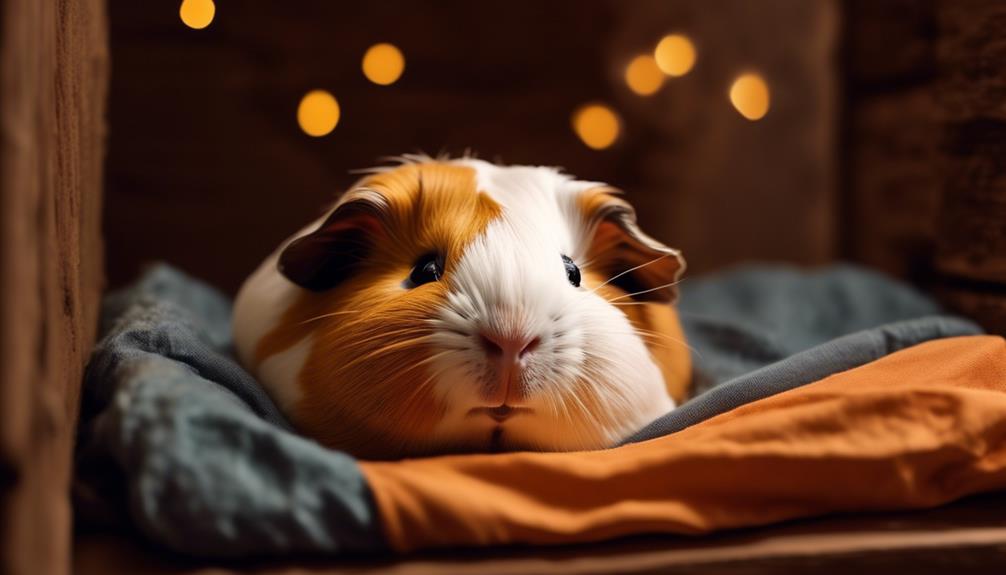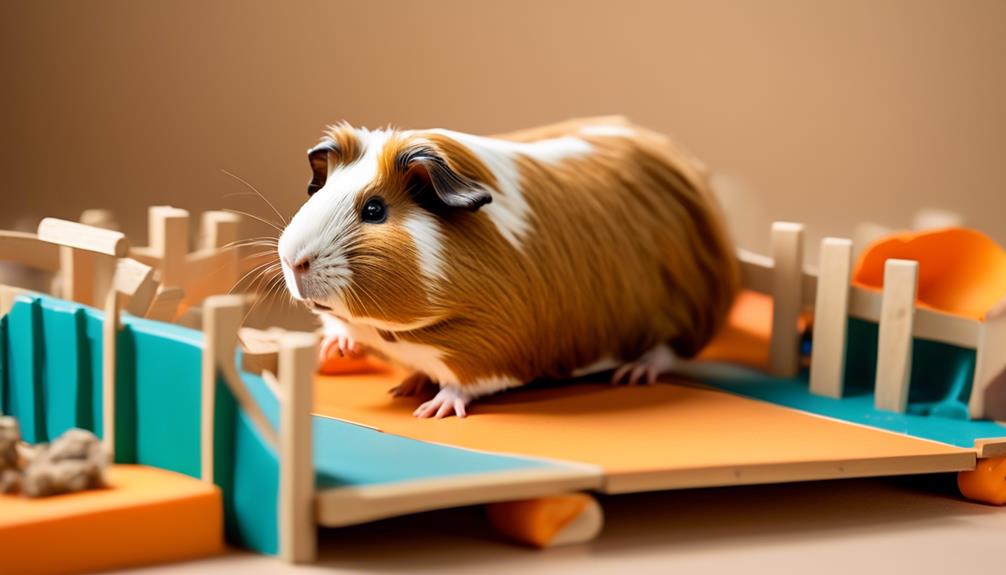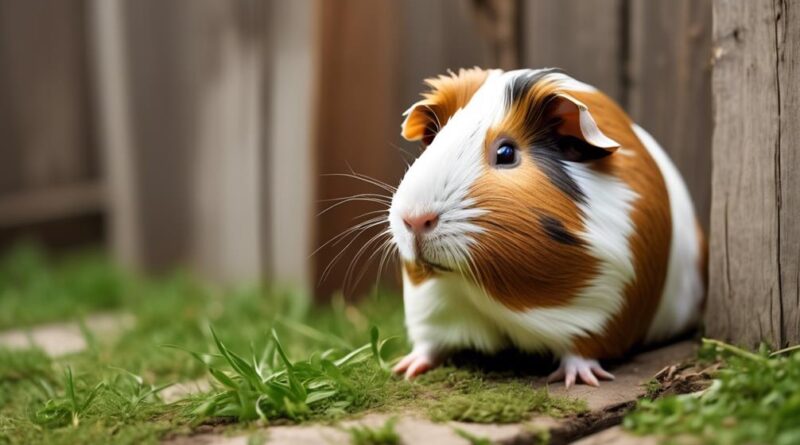Exploring Aging Guinea Pigs' Behavioral Shifts
Have you ever noticed a change in your aging guinea pig's behavior?
As guinea pigs age, they undergo shifts in their behavior that may indicate the need for special care and attention. Understanding these changes can help you ensure your furry friend's well-being in their senior years.
From alterations in activity levels to cognitive changes, aging guinea pigs may exhibit a range of behavioral shifts.
Let's explore these changes and how you can support your aging guinea pig through this stage of life.
Understanding Aging in Guinea Pigs
As guinea pigs age, their behavior undergoes noticeable shifts, reflecting changes in their physical and mental capabilities. Understanding the lifespan of a guinea pig is crucial for providing appropriate care as they age.
On average, guinea pigs live between 5 to 7 years, but some can live up to 8 years with proper care. As they reach their senior years, it's important to be aware of potential health concerns that may arise. Common health issues in aging guinea pigs include dental problems, arthritis, and obesity. Dental problems can affect their ability to eat, while arthritis can cause mobility issues. Obesity can lead to a range of health issues, such as heart disease and diabetes. Being attentive to their changing needs and providing a balanced diet with proper nutrients can help mitigate these health concerns.
As guinea pigs age, their behavior may also change. They may become less active, sleep more, and show decreased interest in activities they once enjoyed. Additionally, they may be more prone to stress and may require a quieter and more comfortable living environment. Understanding these behavioral shifts can help you provide the necessary support and care for your aging guinea pig.
Regular veterinary check-ups become increasingly important to monitor and address any health issues that may arise. By understanding the lifespan and potential health concerns of aging guinea pigs, you can ensure that they have a comfortable and fulfilling senior life.
Changes in Activity Levels
Understanding the aging process in guinea pigs reveals a significant aspect of their senior years: changes in activity levels become more apparent as they age. As guinea pigs get older, their exercise requirements may change. While they may not be as active as when they were young, it's important to provide opportunities for gentle exercise to maintain their mobility and overall health. In addition, mobility challenges may arise, so it's crucial to create an environment that supports their movements and minimizes the risk of falls or injuries.
When considering exercise requirements for aging guinea pigs, it's essential to provide options that promote movement without putting too much strain on their bodies. This could include larger enclosures with ramps, platforms, and tunnels, which encourage them to explore and move around at their own pace. Additionally, gentle toys such as low-impact wheels or balls can offer a way for them to engage in light physical activity without overexerting themselves.
Environmental enrichment plays a vital role in promoting mental stimulation for aging guinea pigs. As their activity levels may naturally decrease, providing mental stimulation becomes increasingly important to keep their minds active and engaged. This can be achieved through the introduction of new textures and materials in their environment, hiding treats for them to find, and rotating their toys to maintain their interest.
Understanding and addressing changes in activity levels for aging guinea pigs is crucial for promoting their overall well-being and ensuring they lead happy and healthy lives.
Alterations in Social Interactions
With aging, guinea pigs may undergo changes in their social interactions, impacting their behavior and well-being. Social bonding and communication are essential for guinea pigs, and as they age, these interactions may shift. Older guinea pigs might display altered social behaviors, such as decreased interest in social bonding or reduced communication with their cage mates. This could be due to a variety of factors, including declining health, changes in hormone levels, or discomfort associated with age-related conditions.
In some cases, aging guinea pigs may also exhibit changes in aggression and submission within their social groups. For example, a formerly dominant guinea pig may become more passive, allowing others to take the lead in social interactions. Conversely, a previously submissive guinea pig might become more assertive as it ages. These shifts in social dynamics can impact the overall harmony within a group of guinea pigs, potentially leading to conflicts or changes in social hierarchies.
It's important to observe and understand these alterations in social interactions among aging guinea pigs to ensure their well-being. Providing a supportive and enriching environment, along with regular veterinary check-ups, can help mitigate any negative effects of these behavioral changes. Additionally, offering ample opportunities for socialization and ensuring that older guinea pigs have access to comfortable and safe spaces for social interactions can help maintain their overall quality of life.
Shifts in Eating Habits
Considering the impact of aging on guinea pigs' social interactions, it becomes crucial to recognize potential changes in their eating habits as they grow older. As guinea pigs age, they may experience shifts in their food preferences and appetite, which can significantly impact their overall health and well-being.
Here are some key points to consider regarding the shifts in eating habits of aging guinea pigs:
- Food Preferences
- *Variety*: Aging guinea pigs may develop a preference for softer foods or a decreased interest in certain types of vegetables or fruits. It's important to monitor their food choices and adjust their diet accordingly to ensure they receive adequate nutrition.
- *Texture*: Some aging guinea pigs may develop dental issues, leading to a preference for softer food options. Providing them with softer hay and finely chopped vegetables can help accommodate these changes in their eating habits.
- Appetite Changes
- *Decreased Appetite*: As guinea pigs age, they may experience a decrease in their overall appetite. This could be due to various factors such as dental problems, decreased mobility, or underlying health issues. Monitoring their daily food intake and consulting a veterinarian can help address any potential appetite changes and ensure they maintain a healthy diet.
Understanding and addressing the shifts in eating habits of aging guinea pigs is essential for promoting their health and quality of life. By closely observing their food preferences and appetite changes, caregivers can make informed decisions to support their nutritional needs as they enter their senior years.
Modifying Sleeping Patterns

To modify aging guinea pigs' sleeping patterns, assess their environment and provide comfortable bedding and appropriate lighting. Sleep quality in aging guinea pigs is influenced by various environmental factors. Ensure that their sleeping area is quiet and free from disturbances. Guinea pigs are sensitive to light, so it's essential to maintain a consistent light-dark cycle to support their circadian rhythms. Natural light exposure during the day can help regulate their sleep-wake patterns. Additionally, provide a cozy and well-ventilated sleeping area with soft bedding to enhance their sleep quality and duration.
As guinea pigs age, their sleep duration may change, and they may become more sensitive to disruptions. Monitor their sleeping habits closely to identify any shifts in their sleep patterns. It's crucial to create a comfortable and secure sleeping environment to support their overall well-being. Adjusting their sleeping area to accommodate their changing needs can significantly impact their sleep quality.
Cognitive Changes in Aging Guinea Pigs
Aging guinea pigs' cognitive abilities may exhibit changes as they undergo shifts in their sleep patterns and environmental sensitivities. It's important to pay attention to cognitive decline in aging guinea pigs, as it can significantly impact their overall well-being. Here are some key points to consider:
- Cognitive Decline: As guinea pigs age, they may experience a natural decline in cognitive function. This can manifest as a decrease in problem-solving abilities, learning capacity, and overall mental sharpness. Keep an eye out for any signs of confusion or disorientation, as these could indicate cognitive changes.
- *Memory Loss*: One common cognitive change in aging guinea pigs is memory loss. They may struggle to remember familiar routes in their environment, forget learned behaviors, or have difficulty recognizing their human caregivers. This can lead to increased stress and anxiety in aging guinea pigs, impacting their quality of life.
It's crucial for guinea pig owners to monitor their pets for any signs of cognitive changes as they age. Providing a stimulating environment, engaging in gentle mental exercises, and ensuring a consistent routine can help support cognitive function in aging guinea pigs. If you notice significant cognitive decline or memory loss in your aging guinea pig, it's essential to consult with a veterinarian who specializes in exotic pets to explore potential management strategies and provide the best possible care.
Adapting to Physical Limitations

Experiencing physical limitations as your guinea pig ages can necessitate adjustments in their environment and care routine. As your furry friend grows older, it's important to consider coping strategies and environmental enrichment to help them adapt to their changing physical abilities.
One effective coping strategy is to provide ramps or platforms in their habitat to make it easier for them to reach their favorite spots. This can help prevent falls and reduce stress on their joints. Additionally, consider adjusting their diet to accommodate any mobility issues they may be experiencing. For instance, providing softer foods or cutting up hay into smaller pieces can make eating more manageable for guinea pigs with dental problems or arthritis.
Environmental enrichment is also crucial for guinea pigs with physical limitations. Incorporating toys and activities that stimulate their senses can help maintain their mental and emotional well-being. Puzzle feeders, chew toys, and tunnels can provide mental stimulation and encourage physical activity within their capabilities.
Furthermore, creating a comfortable and safe space for your aging guinea pig is essential. Ensure that their habitat is easily accessible and free from obstacles that could pose a challenge to them.
Managing Behavioral Changes
As your guinea pig adapts to physical limitations, it becomes essential to monitor and manage any behavioral changes that may arise. Aging guinea pigs may exhibit shifts in behavior due to a variety of reasons, including declining health and cognitive abilities. To ensure the well-being of your pet, it's important to implement coping strategies and environmental enrichment to support them through these changes.
- Coping Strategies:
- Routine: Establish a consistent daily routine for feeding, playtime, and interaction to provide a sense of predictability and security for your guinea pig. Regularity can help alleviate stress and anxiety.
- Patience and Understanding: Be patient and understanding towards your guinea pig's needs and limitations. Allow them extra time for activities and provide gentle assistance when necessary.
- Environmental Enrichment:
- Toys and Activities: Introduce new toys and activities that are suitable for aging guinea pigs. Puzzle feeders, soft tunnels, and gentle exercise opportunities can stimulate their minds and bodies.
- Comfortable Environment: Create a comfortable living space with soft bedding, hiding spots, and easily accessible food and water. Consider adding safe, chewable items to promote dental health and mental stimulation.
Frequently Asked Questions
How Do Aging Guinea Pigs' Behavioral Shifts Compare to Those of Other Small Pets, Such as Rabbits or Hamsters?
Comparing aging guinea pigs' behavioral patterns to those of other small pets like rabbits or hamsters reveals differences in activity levels and social behaviors. As they age, guinea pigs tend to become less active and more solitary.
Can Certain Environmental Factors, Such as Noise Levels or Temperature, Impact an Aging Guinea Pig's Behavior?
Certain environmental factors, like noise levels and temperature, can significantly impact an aging guinea pig's behavior. Additionally, social interaction and dietary changes also play a crucial role in influencing their overall well-being and behavior.
Are There Specific Toys or Activities That Can Help Stimulate an Aging Guinea Pig's Mind and Prevent Cognitive Decline?
To prevent cognitive decline, provide mental stimulation and enrichment for your aging guinea pig. Incorporate toys and activities that challenge their mind, such as puzzle feeders or tunnels. Regular interaction and introducing new experiences can help maintain their cognitive abilities.
How Can Owners Help Their Aging Guinea Pigs Adjust to Physical Limitations, Such as Arthritis or Decreased Mobility?
To help your aging guinea pig adjust to physical limitations, such as arthritis or decreased mobility, consider dietary adjustments and tailored exercise routines. Provide comfortable habitats and implement bonding techniques to support their well-being.
Are There Any Warning Signs of More Serious Behavioral Changes That May Indicate a Health Issue in Aging Guinea Pigs?
If you notice any unusual behavioral changes like excessive hiding, aggression, or decreased appetite in your aging guinea pig, these could be warning signs of potential health issues. It's important to monitor these changes and consult a vet promptly.
Conclusion
As your guinea pig ages, you can expect to see shifts in their behavior. These changes may include alterations in activity levels, social interactions, eating habits, sleeping patterns, and cognitive abilities.
It's important to adapt to your guinea pig's physical limitations as they age. This may involve providing them with easier access to food and water, as well as modifying their living environment to accommodate any mobility issues.
Managing any behavioral changes that may arise is also crucial. This can involve providing mental stimulation through toys and puzzles, as well as ensuring a safe and comfortable space for your guinea pig to rest and relax.
By understanding and addressing these shifts, you can ensure that your aging guinea pig remains happy and comfortable in their later years.
